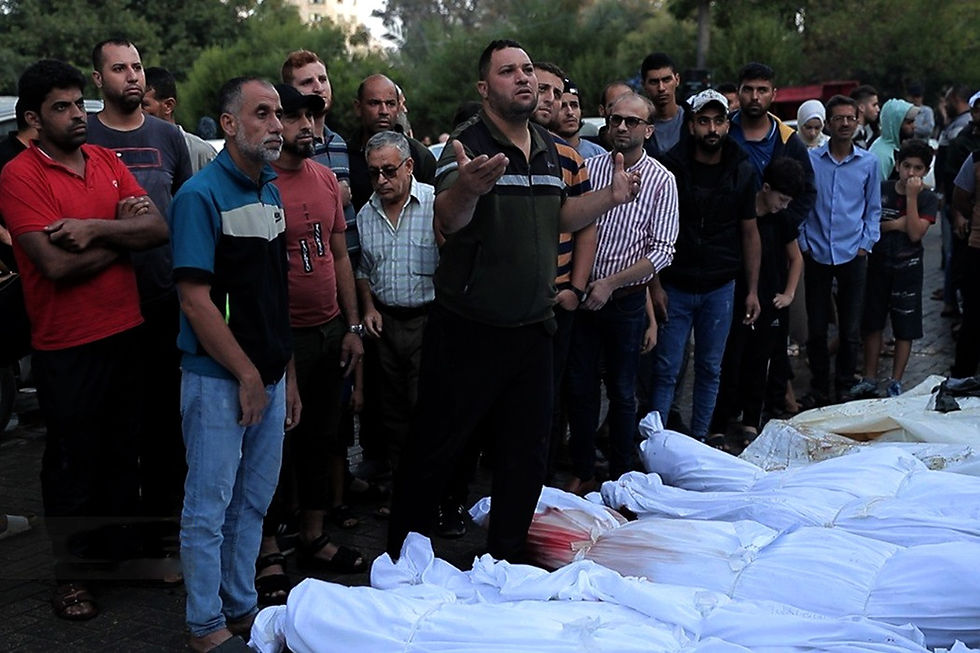When truth dies
- Khushi Goahit-Hariri, William Raven, and Evan Verpoest
- Aug 25, 2025
- 4 min read
Perspectives editors on the targeted killing of journalists in Gaza and the West Bank.
By Khushi Goahit-Hariri, William Raven, and Evan Verpoest

It is often said that "the first casualty of war is the truth" and in times like these it becomes impossible to deny it, especially when those who cherish it most are among the targeted. Democracies have long prided themselves on the essential roles of truth and openness in society. Yet, for almost two years of conflict, Israeli attacks in Gaza have gone without the journalistic scrutiny that almost all other modern wars, fought by democratic nations, are privy to.
The killing of al-Jazeera journalist Anas al-Sharif, and four of his colleagues on the 10th August, sparked "global fury" and widespread condemnation. The deaths of five further journalists fifteen days later, in an Israeli strike on Nasser Hospital demonstrates that, tragically, these attacks will continue for as long as the war does. To war correspondents — the epitome of the journalistic cause — injury, trauma and death are all known risks with a long precedent. What is without precedent, however, is the scale of attempts, violent and non-violent alike, to stifle and stop war journalism by a nation that outwardly purports to pride itself on its democratic principles. Since the outbreak of conflict, following the Hamas attacks of October 7th, over 270 journalists have been killed in Gaza and the West Bank. The Committee to Protect Journalists notes that "this makes it the deadliest conflict for journalists" ever since they began gathering data in 1992.
As Perspectives editors, we resoundingly condemn the killing of journalists in Gaza, as well as wider attempts to stifle the truth in Palestine.
In an increasingly militaristic world, the ability for conflict to be properly scrutinised is a cornerstone of what separates tolerant ideals from malign causes. In equal measure, rigorous scrutiny and fair reporting can be the ultimate protection of legitimate military action. Israel, however, continues to blatantly flaunt the most basic principles of law, human decency, and respect for life. As Perspectives editors, we resoundingly condemn the killing of journalists in Gaza, as well as wider attempts to stifle the truth in Palestine. Palestinian journalists are not only professionals, but innocent individuals and family members. Their continued extraordinary courage, personal sacrifice, and unwavering commitment to the truth will not be forgotten.
The deliberate killing of war journalists is not only a profound tragedy for the loved ones they leave behind, but an assault on the crucial role they play in society. Journalists serve as the eyes and ears of the world. They ensure accountability and bring to light stories of human suffering and resilience. As a vital lifeline for the protection of human rights, silencing war reporters strikes at the foundation of transparency, democratic principles, and justice.
Legal experts, including UN rapporteur Francesca Albanese, are unanimous in their view that actions which "amount to genocide" are being perpetrated by the Israeli Government in the Palestinian territories of Gaza and the West Bank. Silencing the truth is just one part of that puzzle.
Since the 7th October 2023 international journalists have been prevented from entering the Gaza Strip in almost all cases, bar a handful of tightly controlled, Israeli Defence Force led, visits. By preventing international scrutiny, the Israeli Government regularly attempts to discredit Palestinian journalists as "Hamas operatives" or supporters. In the case of Anas al-Sharif, al-Jazeera described him as "one of Gaza's bravest journalists" while the IDF stated that he had "served as the head of a terrorist cell in the Hamas terrorist organisation and was responsible for advancing rocket attacks". No verifiable evidence has yet been provided to support the IDF's claim.
Such attacks on journalists and civilians are shocking and an affront to those who report the truth everywhere.
The UN special rapporteur on freedom of expression, Irene Khan, called it "an unsubstantiated claim" that was a "blatant assault on journalists". Given this online smear campaign, and numerous near death events, al-Sharif was open himself, and prior to his death he stated that he felt he would one day "be bombed and martyred" for his journalism. When, terribly, this came true, al-Sharif died reporting the truth of Israeli actions in Gaza. A colleague who survived him in a nearby tent, Wadi Abu al-Saud, was captured on video carrying bodies away from the scene of the strike saying, "From now on, I will not continue the coverage. I will return to my life as a citizen. The truth has died, and the coverage has ended".
Such attacks on journalists and civilians are shocking and an affront to those who report the truth everywhere. As members of an exciting and committed community of student writers and aspiring journalists, we, the Perspectives editorial team, are appalled by the actions of the Israeli Government in attempting to erase and silence Palestinian journalists. We unequivocally support the Committee to Protect Journalists in their demand that "Those responsible for these killings must be held accountable."
Image: Google Creative Commons
Comments